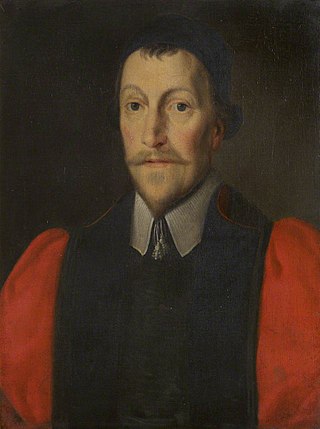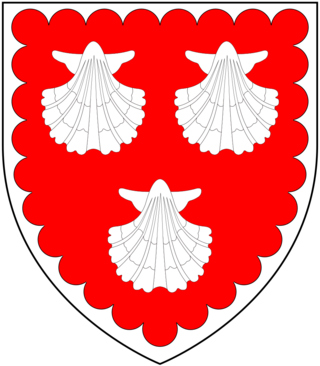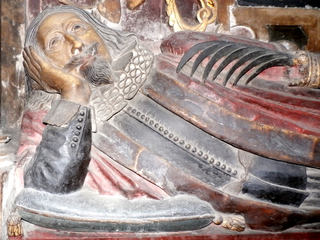Related Research Articles

Emerson Park is a suburban neighbourhood in the London Borough of Havering, east London. The neighbourhood developed as two large housing estates built on the 550 acres (2.2 km2) estate of Nelmes manor in the parish of Hornchurch. Emerson Park estate to the south started construction in 1895 and Great Nelmes estate to the north was begun in 1901. It is located north of the Romford–Upminster line and a station opened at Emerson Park in 1909. The mansion of Nelmes survived until it was demolished in 1967 to avoid preservation by the Civic Amenities Act and was replaced with a small housing estate called The Witherings. Emerson Park is located 15 miles (24.1 km) northeast of Charing Cross in Central London.

Sir Edward Nicholas was an English officeholder and politician who served as Secretary of State to Charles I and Charles II. He also sat in the House of Commons at various times between 1621 and 1629. He served as secretary to Edward la Zouche and the Duke of Buckingham in the Admiralty and became a clerk of the Privy Council. He supported the Royalist cause in the English Civil War and accompanied the court into exile, before assuming the post of Secretary of State on the Restoration.

John Colepeper, 1st Baron Culpeper was an English peer, military officer and politician who, as Chancellor of the Exchequer (1642–43) and Master of the Rolls (1643) was an influential counsellor of King Charles I during the English Civil War, who rewarded him with a peerage and some landholdings in Virginia. During the Commonwealth he lived abroad in Europe, where he continued to act as a servant, advisor and supporter of King Charles II in exile. Having taken part in the Prince's escape into exile in 1646, Colepeper accompanied Charles in his triumphant return to England in May 1660, but died only two months later. Although descended from Colepepers of Bedgebury, Sir John was of a distinct cadet branch settled at Wigsell in the parish of Salehurst.

Sir Oliver St John was an English judge and politician who sat in the House of Commons from 1640-53. He supported the Parliamentary cause in the English Civil War.

Sir Richard Wynn, 2nd Baronet was a Welsh courtier and politician who sat in the House of Commons at various times between 1614 and 1649.
Henry Grey, 10th Earl of Kent, known as Lord Ruthin from 1639 to 1643, was an English politician who sat in the House of Commons in 1640 and succeeded to the title Earl of Kent in 1643.

Edmund Prideaux of Forde Abbey, Thorncombe, Devon, was an English lawyer and Member of Parliament, who supported the Parliamentary cause during the Civil War. He was briefly solicitor-general but chose to resign rather than participate in the regicide of King Charles I. Afterwards, he was attorney-general, a position he held until he died. During the Civil War and for most of the First Commonwealth he ran the postal service for Parliament.
Daniel O'Neill was an Irish army officer, politician, courtier and postmaster general. He was part of the O'Neill Dynasty of Ulster, the nephew of Owen Roe O'Neill and the great-nephew of Hugh O'Neill, Earl of Tyrone.
Henry Parker (1604–1652) was an English barrister and political writer in the Parliamentarian cause.

The General Post Office (GPO) was the state postal system and telecommunications carrier of the United Kingdom until 1969. Established in England in the 17th century, the GPO was a state monopoly covering the dispatch of items from a specific sender to a specific receiver ; it was overseen by a Government minister, the Postmaster General. Over time its remit was extended to Scotland and Ireland, and across parts of the British Empire.

William Beale was an English royalist churchman, Master in turn of Jesus College, Cambridge and St John's College, Cambridge. He was subjected to intense attacks by John Pym from 1640, for an unpublished sermon he had given in 1635 supporting royal prerogative. According to Glenn Burgess, Pym's attention to Beale was because he exhibited a rare combination of Arminian or Laudian theological views with explicit political views tending to absolutism.

Thomas Erle was an English lawyer and politician who sat in the House of Commons from 1640 to 1648. He supported the Parliamentarian cause in the English Civil War.
Unton Croke was an English judge and politician who sat in the House of Commons in 1628 and 1640. He supported the Parliamentarian cause during the English Civil War.

Richard Ferris was a wealthy merchant from Barnstaple in Devon, England who served as a Member of Parliament for Barnstaple in 1640 and served twice as Mayor of Barnstaple in 1632 and 1646. He founded the Barnstaple Grammar School, otherwise known as the "Blue School".
William Singleton was an English politician who sat in the House of Commons in 2023.
He fought briefly on the side of the Parliamentarians in the English Civil War.
John Barker was an English draper and politician who sat in the House of Commons between 1640 and 1653. He supported the Parliamentary side in the English Civil War.
John Gayer or Gayre was an English merchant who was Lord Mayor of London in 1646.

Abraham Reynardson was an English merchant who was Lord Mayor of London in 1649.

The postal service of the British Army is today provided by the British Forces Post Office but its origins may be traced back to Saxon times.
Edward Hyde (1607–1659) was an English royalist cleric, nominally Dean of Windsor at the end of his life.
References
- Beaven, Alfred P (1908) [1908]. "Chronological list of aldermen: 1601–1650". The Aldermen of the City of London: Temp. Henry III – 1912. pp. 47–75. Retrieved 13 January 2011.
- Blackstone, Sir William (1832). Christian, Edward; et al. (eds.). Commentaries on the laws of England: With an Analysis of the Work, Archer Ryland. Vol. 1. J.B.Lippinocott & Company. p. 240.
- Hyde, J. Wilson (1894). The Post in Grant and Farm. London: Adam & Charles Black.
- Lewins, W (1865). Her Majest's Mail. London: Sampson, London. p. 38.
- Powell, W.R, ed. (1978). Hornchurch: Manors, A History of the County of Essex. Vol. 7. pp. 31–39. Retrieved 14 January 2011.
- Society for the Diffusion of Useful Knowledge (Great Britain) (1840). "Post Office—History". The Penny Cyclopædia of the Society for the Diffusion of Useful Knowledge . Vol. 17–18. C. Knight. p. 454.
- Willis, Browne (1750). "The Fourth Parliament, at Westminster, Anno 15". Notitia parliamentaria, or, An history of the counties, cities, and boroughs in England and Wales: ... The whole extracted from mss. and printed evidences. R. Gosling. pp. 229–239.